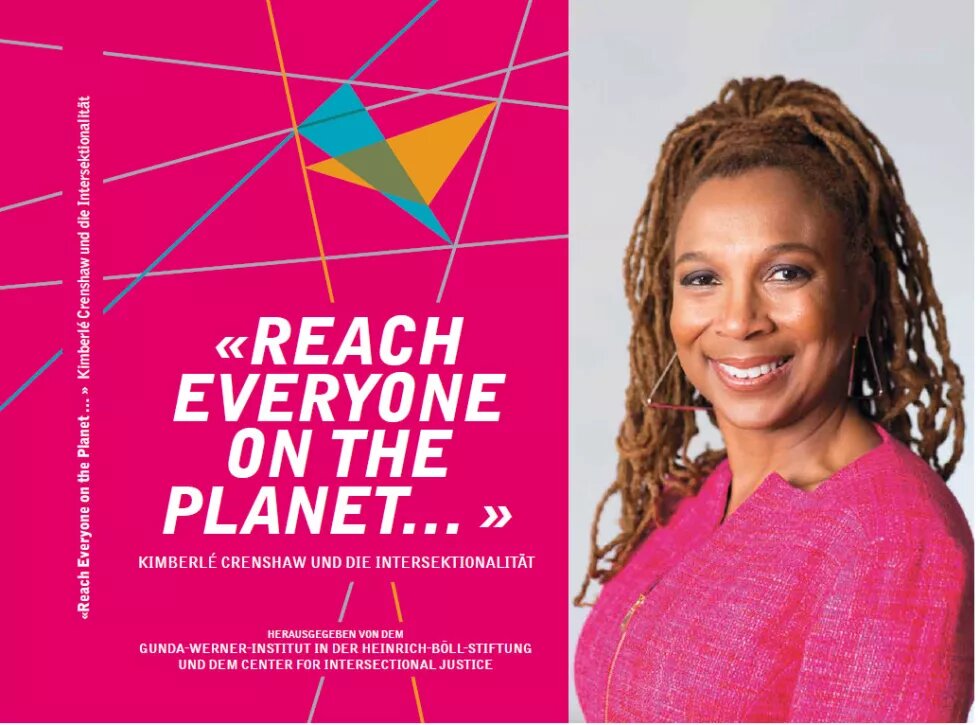"A truly intersectional feminism can reach everyone on the planet," K. Crenshaw is convinced. In the publication, activists, artists and researchers tell why and, above all, how Crenshaw continues to inspire them today.

“A truly intersectional feminism can reach everyone on the planet”… This statement was made by Kimberlé Crenshaw during the “Where We Go From Here?” panel discussion during the Women’s Town Hall & Reception held at the National Press Club in Washington D.C. in January 2017. Only when the rights and interests of the most marginalized people are enforced, so her conviction, will feminism reach everyone across the globe. This is the core task of any intersectional approach: not just scratching the surface but specifically tackling social injustices at their very roots.
In searching for a title to this small collection of texts by and for Kimberlé Crenshaw, the Center for Intersectional Justice (CIJ) and the Gunda Werner Institute were instantly on the same page. This is what it is about: we want to disband the norm that upholds white people without impairments as the standard and degrades People of Color, queer and trans people. To our mind, only by doing so can we make any form of contribution towards the grand project of global justice, which truly includes everybody—no matter how different our reality of life—and which strives to overcome patriarchy, capitalism and racism as the key intertwined systems of rule. What therefore could be more obvious than to act on the assumption of a concept that finds its voice in the interaction of various forms of discrimination, and makes people visible and empowers them in all their diversity and political struggles? Intersectionality is more than a theoretical concept. It is a political project.
Reach Everyone on the Planet. Kimberlé Crenshaw and Intersectionality is volume II in a series which the GWI always publishes in cooperation with partners. The first volume, titled “Die Freundschaft zur Welt nicht verlieren” 14 (Not to lose the friendship to the world) was dedicated to Christina Thürmer-Rohr, who, as the first openly lesbian and single-mother professor in West-Berlin, coined the concept of complicity in the early 1980s. It came into being in collaboration with Professor Sabine Hark.
2019 marks thirty years since the US professor of law, Kimberlé Crenshaw, published the groundbreaking article “Demarginalizing the Intersection of Race and Sex”. Even today, it is considered the foundational text of the concept of intersectionality coined by her. In it, Crenshaw criticizes US’- anti-discrimination law by dissecting three court rulings. In each instance, actions brought by Afro-American women were dismissed on the grounds of having been discriminated because of their being Black and being women. The dismissal of these actions was built on the grotesque argument that recognizing multiple forms of discrimination would result in the affected women being given preferential treatment. As if interlaced degradations could offset the respective other’s toxic impact!
“To reach everyone on the planet…” Undoubtedly, this vision is massive, and we are not. It was therefore all the more important for us, as editors, to invite outstanding intersectional activists, academics and artists from across Europe to enable them to illuminate how their encounter with Kimberlé Crenshaw, or the concept of intersectionality she has coined—the lens of intersectionality, as she herself phrases it—has inspired and reinforced them in their work and thinking, and what they have done with this up to today. Many, many thanks to everyone who has taken part! Thanks to you, it is becoming visible how spirited the concept of intersectionality is, how it is being further developed also in Europe and Germany and is taking on new facets—without compromising its original intention: that of empowering Black women and supporting their political struggles. On its journey from the USA to Europe, 15 intersectionality has undergone a process of depoliticization and whitening. Through this volume, we hope that we are doing justice to the subversive essence of the concept and referencing critical race theory analyses that are still all too often delegitimized in Europe.
Our deep gratitude goes out to our colleagues, Peggy Piesche, Miriam Aced and Hannah Lichtenthäler, without whom this volume could never have been completed!
Last but not least, we, once again, extend our gratitude to Kimberlé Crenshaw, who provided the photos for this volume and thus also gives us a very personal insight into her work. We are delighted to have the privilege of refering to you as outstanding feminist personality and look forward to celebrating the 30th anniversary of intersectionality at the Second Feminist Gala at the Heinrich Böll Foundation in Berlin.